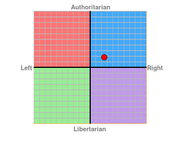Selucian Traditional Movement Motus Traditionalis Selucianus | |
|---|---|
 | |
| Abbreviation | MTS |
| Chairperson | Hasdrubal Adad |
| General Secretary | Hieronymus Gennadius, Vasudharman Pattanadhipati |
| Founder | Euthymia Bellona, Faustinus Pamphilus |
| Founded | November 19, 4801 |
| Headquarters | Argona, Sadaria |
| Student wing | Students for Mos Maiorum |
| Youth wing | Young Traditionalists |
| Women's wing | Traditionalist Women |
| LGBT wing | Queer Traditionalists |
| Ideology |
Traditional conservatism Pagan traditionalism Imperial republicanism, Localism |
| Political position | Right |
| Religion | Religio Seluciana, Selucian Aurorian Church |
| Colors | MidnightBlue |
| People's Assembly |
379 / 750 |
| Praetorships |
4 / 6 |
| Magistrates |
7 / 14 |
| Website | |
| www.mts.se | |
| <templatestyles src="Plainlist/styles.css"></templatestyles> | |
The Selucian Traditional Movement (Selucian Motus Traditionalis Selucianus) is a political party in Selucia, founded in November 4801 during the 11th Republic. The Movement was founded by deputies serving in the People's Constituent Assembly (4797-4802) with the goal of continuing the policies and reforms introduced by the Duodecemvirs. The Movement is dedicated to restoring the institutions and cultural and religious practices of the first Selucian republic and adapting them to a modern context. Most controversially, one of the party's main goals is the establishment of Selucian polytheism as the dominant religion in Selucia, although the Movement is also supported by Hosians associated with the Constitutionalist faction in the Aurorian Patriarchal Church and atheists and agnostics affiliated with the non-theistic "Church of Reason".

Ideological positioning of the Selucian Traditional Movement
Although in the first elections of the new party it only gained 14% of the vote, it quickly rebounded in 4807 to become the largest political faction in Selucia, a position it maintained in the following elections. In 4817 the Selucian Traditional Movement lost its absolute majority, but it retained its status as the largest party as well as control over six of the seven tribunates.
